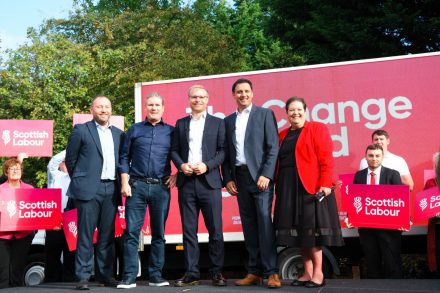
Keir Starmer is fleshing out what to expect from a Labour government’s economic policy in a speech at the Resolution Foundation think tank later today, including warning voters not to expect the party to “quickly turn on the spending taps”.
The comments trailed in advance of the speech made waves before it was even delivered at the launch of the RF’s Ending Stagnation report this afternoon, splashing The Guardian‘s frontpage.
It comes after he also sparked significant attention and controversy on the left over the weekend, by saying former Tory prime minister Margaret Thatcher had delivered “meaningful change”.
You can watch the full Starmer speech here live from 2pm:
Here’s what we learned from the trailed parts of the speech; we’ll update this later if there are further updates after he delivers it.
1. Public services – we need growth to fund them, ‘ruthless’ focus on spending wisely and to change ‘behaviour’
“Anyone who expects an incoming Labour Government to quickly turn on the spending taps is going to be disappointed. Growth will have to become Labour’s obsession if we are to turn around the economy,” he is expected to say in a significant ramping up of party expectation management.
He’ll add: “It’s already clear that the decisions the Government are taking, not to mention their record over the past thirteen years, will constrain what a future Labour government can do.
“The comparison between 2010 and today is instructive. Now, debt and interest rates are much higher. Britain’s standing is diminished. Growth is stagnant and public services are on their knees. Taxes are higher than at any time since the war, none of which was true in 2010.
“Never before has a British government asked its people to pay so much, for so little. Inflation, debt, taxes; we face huge constraints.”
Growth will be my Labour government’s obsession.
We will turn our economy around. https://t.co/RyLuxUR0TQ
— Keir Starmer (@Keir_Starmer) December 4, 2023
“We will be ruthless when it comes to spending every pound wisely. I ran a public service in the bad days of austerity. I know how hard it can be. But I also know you can always find ways to improve delivery and change your practice, your behaviour, and reform your approach.
Later he’ll add: “I want a better bargain for the public – stronger growth, rising incomes, generating the wealth we need to fund our public services.
“It’s not the case that ‘any growth’ will do. No, we can’t be agnostic about the sort of growth we pursue, anymore. The growth we need must better serve working people. And must raise living standards in every community.”
2. Painting Tories as having broken the ‘work hard, get on’ promise
He’ll focus on living standards, claiming “this Parliament is on track to be the first in modern history where living standards in this country have actually contracted”.
“Household income growth is down by 3.1% and Britain is worse off…This is Britain going backwards. This is worse than the 1970s, worse than the recessions of the 1980s and 1990s, and worse even than the great crash of 2008.”
He’ll also suggest this marks a breakdown in what people can legitimately expect from government, just as prime minister Rishi Sunak appears to be stepping up a focus on forcing more people into work and claiming to be ensuring “work always pays“.
“The security blanket, that hard work would be rewarded, sadly no longer exists,” Starmer will say.
“The political consensus that if you work hard and play by the rules, you will get on – a glue that binds British society together – has become nothing short of a lie for millions of people.”
A pledge to make work pay through Labour’s new deal for working people was also a key part of the Rutherglen by-election pitc.
As a general election nears, it remains to be seen how far Starmer will seek to hype up the new deal as a solution to the cost-of-living squeeze that does not involve significant public spending, or play or water it down further for fear of alienating business or voters on the right.

3. Labour ‘united’ on productivity growth and wealth creation
“The defining purpose of the next Labour government, the mission that stands above all others, will be raising Britain’s productivity growth,” Starmer is expected to say.
“A goal that for my Labour Party is now an obsession. That’s a big change for us. Having wealth creation as our number one priority, that’s not always been the Labour Party’s comfort zone. But that’s the change I knew was necessary, and that’s the change I’ve delivered. And my party is united behind it.”
The suggestion the entire Labour party is united behind wealth creation as its main priority is likely to raise eyebrows, while the word ‘productivity’ may see some eyes glaze over.
But given Labour’s current focus on electorally safety-first economic management, playing down the prospect of significant tax hikes and borrowing, the boosting growth and boosting productivity are a logical next step.
Put bluntly, if firms can find ways of producing a lot more for less, they can theoretically pay out more in wage rises, taxes that support public services and profits too.
That said, there’s no guarantee the gains from higher productivity do find their way to workers or the taxman, and a risk they can come at the cost of jobs, and just as importantly the “puzzle” of low productivity growth has been perplexing economists and frustrating the Treasury for many years – so boosting it may be far from easy.
4. Securonomics, ‘competitive’ taxes and mental health support to make work pay
One for the economic policy wonks – Labour press office have dubbed “securonomics“, the economic programmed based on security and outlined by Rachel Reeves earlier this year, a “new modern supply side theory”.
Starmer will say: “With securonomics as our guide, there are big steps we can take quickly that will get British growth moving.
“One, we must tackle restrictive planning laws and get Britain building again. Two, we can back British business with a competitive tax regime, a new direction on skills, and a proper industrial strategy drawn up with business.
“Three, we will broker a new deal to make work pay with increased mental health support, fully-funded plan to cut NHS waiting lists, an end to zero hour contracts, no more fire and rehire, and a real living wage.”
The promise of a “competitive tax regime” is noteworthy, begging the question of whether Labour may not just shun tax rises but slash them in some areas.
The inclusion of “increased mental health support” in a section on making work pay is notable too; mental health had featured briefly in published documents on Labour’s new deal, but you do wonder if its inclusion reflects the Tories’ new focus on getting more sick and disabled people into work.




More from LabourList
Ashley Dalton resigns as health minister for cancer treatment
Paul Nowak column: ‘Labour must focus on the basics’
‘Labour’s two-child cap victory rings hollow while asylum-seeking children remain in poverty’